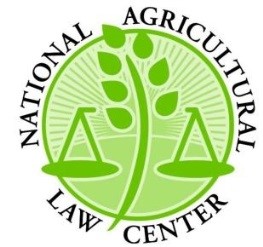A comprehensive summary of today’s judicial, legislative, and regulatory developments in agriculture and food. Email important additions HERE.
ANNOUNCEMENT: Join us Wednesday, September 6, at 12 noon (ET) for an Agricultural & Food Law Consortium webinar: “Water Law Update.” Details available here.
JUDICIAL: Includes PACA, urb & ag, and CWA issues.
HORTI AMERICAS, LLC, Plaintiff, v. STEVEN PRODUCE KING, INC. et al., Defendants, 16 Civ. 889 (ILG) (RER), 2017 WL 3610519 (E.D.N.Y. August 22, 2017), plaintiff entered contract to sell pickles to defendant and contract sets forth quality specifications for the pickles, “including that the ‘[q]uality must be #1,’ and the ‘product must be crunchy and dark green.’” Plaintiff sued under the Perishable Agricultural Commodities Act (PACA) after receiving no payment on any shipments from defendant. Defendant argued that none of the shipments conformed to contract specifications, creating losses that mitigate plaintiff’s damages. Court noted defendant “sustained no economic loss or provable damage related to the shipments from [plaintiff] at issue in this case.” Court also noted that PACA requires the produce buyer to maintain records that “contain specific information regarding goods returned or rejected by a buyer, goods dumped as commercially worthless, and regarding other allowable expenses,” and defendant failed to maintain those records. Plaintiff’s motion for summary judgment granted.
In MERCURY CASUALTY COMPANY, Plaintiff and Respondent, v. CITY OF PASADENA, Defendant and Appellant, B266959, 2017 WL 3634467 (S.D. Cal. August 24, 2017) an insurer sued City after a tree fell on the home of its client. The tree abutted the client’s property and City owned the tree. Trial court ruled that the tree was a “work of public improvement that supported an inverse condemnation claim.” Appellate court observed that “[i]nverse condemnation liability ultimately rests on the notion that the private individual should not be required to bear a disproportionate share of the costs of a public improvement.” Appellate court reversed lower court, finding the tree was not a work of public improvement as there was “no evidence it was planted as part of a planned project or design serving a public purpose or use.”
In FLINT RIVERKEEPER, INC., et al., Plaintiffs, v. SOUTHERN MILLS, INC., d/b/a Tencate Protective Fabrics, Defendant, No. 5:16–CV–435 (CAR), 2017 WL 3599194 (M.D. Ga. August 15, 2017) plaintiffs alleged defendant violated the CWA by “unlawfully discharging polluted industrial wastewater into tributaries of the Flint River, both overland and via groundwater with a direct hydrological connection to surface water.” Court considered defendant’s motion seeking a “certification for interlocutory appeal,” and concluded that “an interlocutory appeal will not advance the ultimate termination of this litigation.” Court noted that “whether the discharges pollutants from a point source into ‘navigable waters’ via hydrologically connected groundwater ‘requires a full review of the facts, not simply a conclusion based on the law.’” Motion to dismiss denied.
LEGISLATIVE:
H.R. 1807: Public Water Supply Invasive Species Compliance Act of 2017. Bill’s text for status is now available.
H.R. 3665: To require the Inter-Agency Task Force on Harmful Algal Blooms and Hypoxia to develop a plan for reducing, mitigating, and controlling harmful algal blooms and hypoxia in the Greater Everglades region. Bill referred to the House Committee on Natural Resources and House Committee on Science, Space, and Technology.
REGULATORY: Includes EPA, FWS, FSIS, ITA, and NOAA rules and notices.
ENVIRONMENTAL PROTECTION AGENCY:
Rule EPA is approving state implementation plan (SIP) revisions submitted by the State of Alaska Department of Environmental Conservation (ADEC) on September 15, 2016. Details here.
Rule that the Kentucky Division for Air Quality (KDAQ) submitted revisions to the Kentucky State Implementation Plan (SIP) on behalf of the Louisville Metro Air Pollution Control District. Info here.
Rule EPA is approving a state implementation plan (SIP) revision submitted by the State of Maryland. Info here.
Rule EPA is taking direct final action to approve a revision to the State of Maryland’s state implementation plan. Info here.
Rule EPA is approving Tennessee’s RACM determination for the Knoxville Area. Details here.
Rule EPA is approving revisions to the Commonwealth of Virginia state implementation plan. Info here.
Rule modifies the testing procedures approved for analysis and sampling under the Clean Water Act. Info here.
FISH AND WILDLIFE SERVICE:
Notice FWS revised the stock assessment report (SAR) for the southern sea otter stock in the State of California, including incorporation of public comments. Info here.
Notice FWS issued permits to conduct certain activities with endangered species, marine mammals, or both. Info here.
FOOD SAFETY AND INSPECTION SERVICE: Notice FSIS is soliciting nominations for membership on the National Advisory Committee on Microbiological Criteria for Foods to fill 15 vacancies. Info here.
INTERNATIONAL TRADE ADMINISTRATION:
Notice ITA preliminarily determines that countervailable subsidies are being provided to producers and exporters of biodiesel from Argentina. Info here.
Notice ITA preliminarily determines that countervailable subsidies are being provided to producers and/or exporters of biodiesel from the Republic of Indonesia. Details here.
NATIONAL OCEANIC AND ATMOSPHERIC ADMINISTRATION:
Rule NMFS partially approves and implements through regulations measures included in the Mid-Atlantic Unmanaged Forage Omnibus Amendment, as adopted by the Mid-Atlantic Fishery Management Council and approved by NMFS on June 13, 2017. Info here.
Rule NMFS is temporarily closing the U.S. commercial fishery for Pacific bluefin tuna in the eastern Pacific Ocean (EPO) through December 31, 2017, because the 2017 catch limit of 425 metric tons has been exceeded. Details here.
Notice the Regional Administrator, NMFS West Coast Region, has determined that twenty-seven exempted fishing permit (EFP) applications warrant further consideration. Details here.
Notice of Public Comment Period for the Jobos Bay National Estuarine Research Reserve Management Plan revision. Details here.
